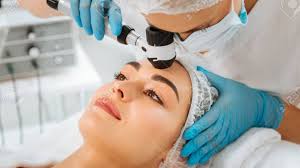If you or someone you love is struggling with eczema, you know how frustrating and uncomfortable it can be. The itching, redness, dryness, and irritation can make everyday life difficult. That’s why finding the right help — especially from a certified dermatologist — can make a big difference. But how do you choose the right one?
In this article, we’ll guide you in simple, human language through the important steps to help you choose a certified dermatologist for eczema treatment. Let’s make the process easier for you!
Why You Need a Dermatologist for Eczema
Eczema (also called atopic dermatitis) is more than just dry skin. It’s a chronic condition that needs proper diagnosis and long-term management. While general doctors can help, a board-certified dermatologist specializes in skin and is trained to understand your condition deeply. They can:
- Diagnose your specific type of eczema
- Create a personalized treatment plan
- Prescribe medications (like topical steroids or new biologics)
- Recommend skincare routines and lifestyle tips
- Help manage flares and avoid triggers
Step-by-Step: How to Choose the Right Dermatologist for Eczema
1. Check Their Credentials
Look for a dermatologist who is board-certified. This means they’ve gone through special training and passed exams related to skin care and diseases.
- In the U.S., look for certification from the American Board of Dermatology.
- In other countries, check your national dermatology board.
- You can usually verify this online on their clinic’s website or a professional board directory.
2. Look for Eczema Experience
Some dermatologists focus more on cosmetic treatments, while others specialize in skin diseases like eczema.
- Look for a dermatologist who treats eczema regularly.
- Ask how many eczema patients they see or if they’re familiar with current treatments like Dupixent, phototherapy, or patch testing.
3. Read Reviews or Get Referrals
What other patients say matters. You can:
- Read online reviews on sites like Google, Zocdoc, or Healthgrades.
- Ask your primary care doctor or pediatrician for a trusted referral.
- Get recommendations from friends or family with eczema experience.
Look for reviews that mention good communication, kindness, and clear treatment plans.
4. Evaluate Communication Style
Eczema is a condition that needs ongoing care, so a good relationship with your doctor is essential.
- Choose someone who listens to you, explains things clearly, and doesn’t rush.
- See if they offer educational resources, or support for at-home care.
- If you feel ignored or confused during your first visit, that might be a red flag.
5. Consider Convenience and Accessibility
When eczema flares up, you may need quick help. Consider:
- Clinic location: Is it close to your home or work?
- Appointment availability: How soon can they see you?
- Insurance: Do they accept your health insurance or offer reasonable self-pay options?
Also, ask if they offer telehealth (online visits) for follow-ups — very handy for long-term conditions like eczema.
6. Ask About Their Approach to Treatment
Modern eczema treatment has many options. Some dermatologists stick to older methods, while others stay updated on newer therapies.
Ask them:
- Do they offer new treatments like biologics (e.g., Dupilumab)?
- Are they open to natural remedies or integrative approaches if that matters to you?
- Will they customize your treatment to your lifestyle?
Choosing a Dermatologist for Kids with Eczema
If your child has eczema, choose a pediatric dermatologist or one with experience treating kids.
- Look for a child-friendly office.
- Ask if they offer gentle treatments for sensitive skin.
- See if they can guide you on bathing, clothing, diet, and emotional support for your child.
Warning Signs to Avoid
Avoid dermatologists who:
- Rush through appointments
- Don’t explain treatment options
- Aren’t open to your questions or concerns
- Push expensive cosmetic treatments unrelated to eczema
Trust your gut. A good doctor respects your experience and makes you feel heard.
Questions to Ask During Your First Appointment
Here are a few helpful questions to ask:
- What type of eczema do I have?
- What triggers should I avoid?
- What skincare products do you recommend?
- Are there non-steroid options available?
- How can I prevent flare-ups?
- How long before I see improvement?
Write them down or keep them on your phone so you don’t forget.
Extra Tip: Track Your Symptoms
Before your appointment, keep a simple diary of your symptoms. Note when they get worse, what products you use, foods you eat, stress levels, or weather changes. This can help your dermatologist find patterns and personalize your care.
Final Thoughts
Choosing a certified dermatologist for eczema is one of the best steps you can take to manage your condition. It’s not just about treatment — it’s about building a supportive relationship with someone who understands your skin and helps you feel confident again.
Take your time, ask questions, and remember: you deserve clear, healthy, and comfortable skin.
5 Frequently Asked Questions (FAQs)
1. How do I know if a dermatologist is certified?
You can check the official website of your country’s dermatology board or ask the clinic directly. In the U.S., visit abderm.org.
2. Can eczema be fully cured by a dermatologist?
Eczema has no permanent cure, but a dermatologist can help you manage symptoms, reduce flare-ups, and improve quality of life.
3. Should I see a dermatologist if my eczema is mild?
Yes. Even mild eczema can worsen over time. A dermatologist can recommend effective treatments to prevent complications.
4. Is it okay to use natural remedies without seeing a dermatologist?
Always consult a dermatologist before trying natural remedies. Some may cause irritation or allergic reactions.
5. What’s the cost of seeing a dermatologist for eczema?
It depends on where you live, your insurance, and the clinic. Some offer free consultations or sliding-scale fees. Ask in advance.


